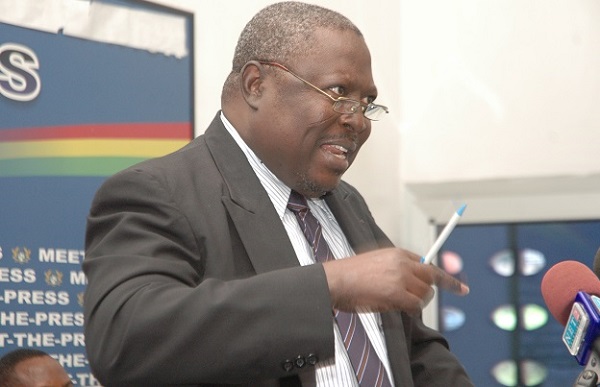
Martin Amidu questions clause in Special Prosecutor bill
A former Attorney-General and anti-corruption crusader, Mr Martin Amidu, has described the insertion of clause 3(4) into the draft Special Prosecutor’s bill to be perused by Parliament as a drawback to the fight against corruption.
He said the insertion of the clause into the original draft of the bill contradicted the promise made by President Nana Addo Dankwa Akufo-Addo during his campaign to fight corruption.
“The attempt to pull a fast one on Ghanaians by the insertion of clause 3 (4) into the bill to negate the fight against corruption is the work of a strong and powerful cabal within the government because they even succeeded in ensuring that the memorandum to the bill was silent on this important insertion so that it will not catch the eye of the casual Ghanaian reading public,” he said.
Explanation
He made those observations in a statement issued yesterday, stressing that the inserted clause clipped the Special Prosecutor’s wings from investigating and prosecuting corruption offences relating to the Public Procurement Act, 2003 and the Criminal Offences Act, 1960 made it problematic.
“Clause 3 (4) undermines the President’s exemplary rhetoric since his assumption of office to relentlessly fight against all forms of corruption. Somebody must be sabotaging the President’s fight against corruption.
“The original draft bill submitted for discussions at the stakeholders’ meeting of 27 to 28 June, 2017, did not include the new Clause 3 (3) and (4). Hence, sub-clause (3) that was added to the bill is, with respect, unnecessary and will be a waste of public funds during the gestation period, particularly, and it is too populist to be enshrined in the law,” he stressed.
According to him, Clause 3(4) which was also not part of the original draft of the Bill, negates the whole promise that the President made during his campaign and after his assumption of office to fight corruption, if as it states 'the Special Prosecutor is not to investigate and prosecute corruption offences relating to the Public Procurement Act, 2003 and the Criminal Offences Act, 1960 ‘....specified under paragraphs (a), (b) and (c) of subsection (1) unless the commission of the offence is in respect of a vast quantity of assets that (a) constitute a substantial proportion of the resources of the country; (b) threaten the political stability of the country; or (c) threaten the sustainable development of the country.’”
Vagueness
Mr Amidu described sub-clause 4 of Clause 3 of the Bill before Parliament as having been shrouded in vagueness and ambiguity, especially for the purpose of determining which corruption cases would meet the standards for investigations to begin.
“The vagueness and ambiguity of the exceptions made provide an argument to be overcome by the Special Prosecutor when the objection is raised in court that his decision to prosecute a corruption offence does not meet the threshold standard stipulated in the bill, “ he stated.
He further observed that the attempt to distinguish the types of corruption offences that may be investigated and prosecuted by the Special Prosecutor sent a clear signal to the public that “the President and his government now accept certain types of corruption offences as not serious for prosecution.”
The bane
Mr Amidu stated that the biggest question that begged for answers regarded who would be responsible for investigating and prosecuting categories of corruption offences by public officers and political figures who did not meet the standards in clause 3 (4).
“There is no rational reason for having two types of prosecutors for the same corruption offence when committed by the same public officers. The exemptions grants immunity to public officers from being prosecuted for committing the exempted corruption offences,” the statement added.
Suspicion
Mr Amidu said the bill did not contain the new clause when it was presented to Cabinet and, therefore, it was surprising that after it was returned to Parliament such inclusions were detected.
“The stakeholders’ meeting of anti-corruption organisations and civil society, I am reliably informed, did not insert sub-clauses 3 and 4 of clause 3 now appearing in the bill before Parliament. The original draft bill, after taking into account the suggestions of the stakeholders, was approved by Cabinet. Was it, therefore, Cabinet that sought to nullify the fight against corruption by inserting this negation of the purpose of the bill?
“I have no doubt that the insertion of clause 3 (4) that negates the whole bill before Parliament was done to enable those proponents to harvest their shameless perceived share of the proceeds of corruption that dishonest appointees criminally exploit in public office,” he stated.
